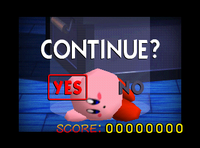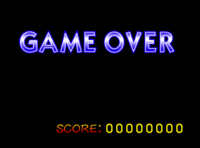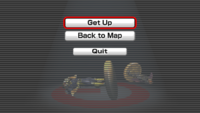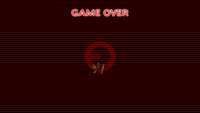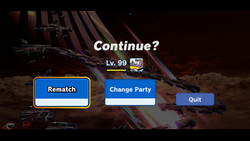Continue
- "Game Over" redirects here. For the tournament, see Tournament:Game Over.
In all five games, when the player loses in a one player match such as 1P Game, Classic, Adventure, or All-Star Mode, they must trade coins in order to have an extra number of lives in stock. This is known as a Continue. Continues can occur in Classic Mode, Super Smash Bros.'s 1P Game, All Star (except in Super Smash Bros. for Nintendo 3DS and Super Smash Bros. for Wii U), Melee's Adventure Mode, Brawl's Subspace Emissary, and Ultimate's World of Light. In Brawl, despite functioning like All Star, in Boss Battles Mode the player has no continues after a game over upon being KO'd (as the player is under Stadium). Smash 4’s All Star (similar to Boss Battles from Brawl) has no continues after a game over upon running out of time or upon being KO'd (as the player is under Solo mode inside Games & More).
In Classic, Adventure, and All-Star
When the player runs out of stocks, they are faced with a screen where the announcer asks if they wish to continue. In the 1P Game of Super Smash Bros., the player can continue as many times as they wish, with points being deducted from the score. In Melee and Brawl, however, the player will not have a choice to continue if they do not have enough coins to pay; they are instead given a Game Over, returning to the menu. If sufficient funds are available, then the player can choose whether or not to continue. If the player chooses "no" and decides to exit, a Game Over still occurs. If they choose "Yes", however, then the game continues, with the player regaining all their lives and continuing the game as usual.
Continuing the game in these three games will cut the total score the player earned in half. However, one point is gained for each continue used; this is presumably meant to indicate that a continue has been used, as otherwise points are gained in increments of 10. In addition, Melee and Brawl continues cause the player to trade a fixed number of coins in order to continue, with higher difficulties costing a higher amount of coins.
In Melee, on both Classic Mode and Adventure Mode, the values are:
- Very Easy = 1 coin
- Easy = 2 coins
- Normal = 3 coins
- Hard = 5 coins
- Very Hard = 10 coins
All-Star Mode in Melee always costs 10 coins regardless of difficulty.
In Brawl, on both Classic Mode and All-Star Mode, these are the values:
- Easy = 10 coins
- Normal = 20 coins
- Hard = 30 coins
- Very Hard = 50 coins
- Intense = 100 coins
If the player cleared the game on any difficulty in Classic Mode, Adventure Mode, or All-Star Mode by using continues, the "Continuation" bonus in Melee or the "Used a Continue bonus" in Brawl is given, worth −20,000 points.
In Boss Battles Mode, only game over, the character selection screen & start all over from the beginning are available.
In Super Smash Bros. for Nintendo 3DS and Super Smash Bros. for Wii U, continuing is only possible in Classic Mode. Unlike in Melee and Brawl, the player no longer use their funds to continue. Instead, it removes some rewards that the player has attained to that point and drops the intensity by 0.5, down to no lower than a minimum of 2.0. A "Game Over" is actually shown before choosing to continue in Super Smash Bros. for Nintendo 3DS. Unlike the previous two installments, only game over, final results display screen, taken back to the character selection screen & start all over from the beginning are available in All-Star Mode.
In Super Smash Bros. Ultimate, the player can continue by spending Gold to lower the intensity or by using a Classic Ticket without lowering the intensity. Upon continuing, the match will start from where the player left off, unlike previous installments.
Subspace Emissary
When the player runs out of stock in the Subspace Emissary, they are faced with a similar choice whether to continue or not. However, there are now three options; Get Up, Back to Map, and Quit. If the player chooses "Back to Map", then they exit the level and can choose another. If they chose "Quit", the game is saved and the player is returned to the Solo menu. Both options cause the player to lose all stickers and trophies they had collected in the level. A Game Over screen appears for "Quit", but not for "Back to Map". Unlike Classic and All-Star Mode, continuing in the Subspace Emissary does not cost coins, but it does carry other consequences.
If the player chooses "Get Up" in the Subspace Emissary, they regain all stock that has been lost, and the following events occur:
- The number of stickers and trophies, including those obtained by the Trophy Stand, attained in the stage is halved. Anything attained from Golden Boxes, however, cannot be lost.
- The player respawns at the last opened door or at the start of the level.
- The amount of coins for clearing that stage is reduced.
World of Light
If a player fails a match in World of Light, they will be given the chance to challenge the fight again by selecting Rematch, the player want to change their party by selecting Change Party and the player won't continue by selecting Quit. Their primary spirit will gain experience, like it does when a match is won, but in a noticeably smaller amount. The player can retry a match as many times as they want to, with no penalty.
Gallery
- MeleeContinue.jpg
The Continue screen in Melee.
Trivia
- Continuing results in the player's score being increased by one. This is used to show how many times the player has continued.
- Kid Icarus: Uprising, a game also directed by Masahiro Sakurai, also uses this system.
- Although the "Continue" screen is overridden by an instant Game Over state if the player runs out of coins, the "Yes" and "No" buttons aren't affected and will appear unless a Game Over occurs after the trophy lands. If automatic continuation is the default action with a Game Over state, the score still deducts in half but the current amount of coins are kept. This can be tested out using the Action Replay codes below:

